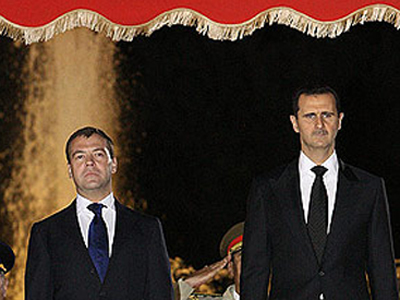Taking Down Damascus in Moscow
Washington's best hope for progress in Syria may be a high-stakes negotiation with Russia.
 Other than what it has already tried, there is nothing the United States can do to stop the violence in Syria or make things better for the opposition forces there: this is the conventional wisdom shared by a good number of analysts in Washington and almost ingrained in the minds of U.S. officials working on Syria policy. But there is another strategy worth pursuing with greater urgency: talk tough and bargain with Moscow.
Other than what it has already tried, there is nothing the United States can do to stop the violence in Syria or make things better for the opposition forces there: this is the conventional wisdom shared by a good number of analysts in Washington and almost ingrained in the minds of U.S. officials working on Syria policy. But there is another strategy worth pursuing with greater urgency: talk tough and bargain with Moscow.
Washington’s policy logjam on Syria is not surprising. There is an acute awareness of the high risks of alternative and perhaps more forceful strategies, be they diplomatic or military. The Obama administration sympathizes with the plight of the Syrian people and is eager to help, but it also does not want to make things worse in that country—and it can’t absorb substantial costs along the way, especially during the fall run-up to the presidential election.
Those who remember the horrors of America’s military intervention in Iraq and the fact that it cost the United States billions of dollars and 4,486 lives so far—not to mention the intangible and indirect costs from the invasion and post-war occupation—may immediately laud the administration for its extra cautious approach toward Syria.
But how much caution is too much? Is Washington being so careful on Syria that it risks undermining U.S. strategic interests in the Middle East?
As things currently stand, the two main U.S. priorities for Syria, containing the civil war and securing the regime’s WMD, are more or less fulfilled. The risk of chemical-weapons loss or usage in Syria is relatively low because Syrian president Bashar al-Assad is not facing a mortal threat—at least not yet. And the sectarian violence inside the country has not furiously spilled over to neighboring countries—again, not yet.
An Agenda for Washington
Does the present calm mean that the United States can afford to watch from afar and do the bare minimum in Syria? Assad may be in good shape now, and the balance of power currently may be tilted in favor of his forces, but several developments could change the dynamics inside Syria in the not so distant future and undermine U.S. priorities there.
Neighboring Turkey is starting to get worried about its own security. The recent firing by Syrian soldiers into a refugee camp inside Turkey (Turkey hosts thousands of Syrian refugees), killing two, has raised the prospects of Turkish military action, with prime minister Recep Tayyip Erdogan calling for NATO intervention. And it is only a matter of time before Saudi Arabia, Qatar and other neighboring countries actually deliver on their promises to supply the Syrian rebels with substantial amounts of money and modern weaponry. Unsurprisingly, Kofi Annan’s peace plan has failed to stop the violence, thus boosting the chances that military options will be seriously entertained by neighboring countries.
The reality is that a full-blown civil war in Syria is in the works, one that will surely change U.S. priorities in the country. Thus, Washington cannot afford to lead from behind. It is smart to repeat that Syria is not Libya in advancing an argument against military intervention. But it is precisely because Syria is not Libya that Washington cannot merely state its concerns and hope for the best. Unlike in Libya, the stakes in Syria are high, and the United States must take charge, although that does not necessarily mean boots on the ground, another Libya-like aerial campaign or other military options.
Washington’s reactive Syria strategy is at risk of being overrun by events on the ground. A more proactive strategy is desperately needed, one that entails tough bargaining and creative diplomacy with the Russians. The United States needs to know what it would take for Russia to abandon the Syrian regime. If it is continued access to the port of Tartous and business opportunities, as well as healthy trade and strategic relations with the next Syrian government, then so be it. The administration should get it on paper and have the Syrian opposition sign off. There also should be frank discussions about the U.S. policy of NATO expansion.
This high-stakes negotiation with Moscow will obviously not be just about Syria. It will be about the future of the Middle East and U.S. strategic interests—oil, Israel, stability and democracy promotion—in that vital part of the world. Maybe the price of Russian cooperation is higher than this, but it's high time Washington negotiates with Moscow in a serious fashion.
If Assad loses Moscow as a friend at the UN Security Council, things will get much tougher for him at home. Russia's change of position could well be the trigger for some real defections in the Syrian government. Yet domestic politics in Washington and Moscow could stand in the way of a more aggressive U.S. diplomatic strategy. Will Barack Obama risk raising the stakes on Syria before November and talk tough with Vladimir Putin? Will Putin play ball at a time when he is trying to reassert himself on the international stage and show domestic opponents that he can defy Washington? It's possible but not inevitable—and only an offensive diplomatic strategy can keep the possibility open.
Bilal Y. Saab is a visiting fellow at the Center for Nonproliferation Studies at the Monterey Institute of International Studies.
Image: www.kremlin.ru
